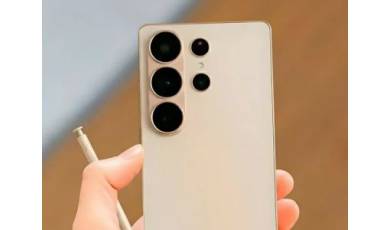Flash firmware on Xgody G400
Mobiles >> Xgody >> Xgody G400| Specifications | Reviews | Secret codes |
| Unlock phone | Root phone |
| Backup | Flash Firmware | Screenshot |
How to flash Xgody G400?
Why reinstall the firmware?
Errors start to appear in the operating system.
Some applications will not open.
Some programs from the Play Market do not start.
The phone restarts or shuts down randomly.
The phone began to work slowly.
The OS does not match the system requirements of the smartphone.
Where can I find the firmware?
On the official website of the manufacturer.
On sites where third-party developers and phone manufacturers post custom or official OS.
What should be done before installing the firmware?
Create a backup copy of user data, contacts and photos and transfer it to your computer.
Insert SD card. An SD card is needed to write firmware to it.
Find information about your smartphone model.
Charge your phone fully. If the battery runs out during boot, the device will no longer turn on. It will be difficult to restore it.
Find and download the archive with Firmware. Place it on the SD card.
Installing TWRP Recovery
Download and install the Official TWRP App from the Play Market.
When you start the application for the first time, you must agree to install a new firmware and all the risks associated with this, as well as agree to grant the application Superuser rights and click the 'OK' button.
In the next screen, select the item 'TWRP FLASH' and provide the application with root-rights.
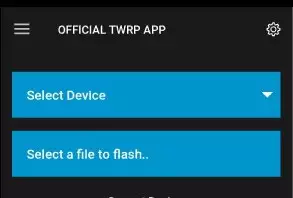
On the main screen of the application, select 'Select Device', and find your phone model.
After selecting the phone, the program will redirect the user to a web page to download the corresponding image file of the modified recovery environment. Download the proposed *.img file.
After downloading the image file, go to the main screen of the Official TWRP App and press the 'Select a file to flash' button. Then we tell the program the path where the file loaded in the previous step is located.
Press the 'FLASH TO RECOVERY' button and confirm your choice, press 'OK'.
When the message 'Flash Completed Succsessfuly!' appears on the screen. Click the 'OK' button. The TWRP installation procedure is now complete.
Copy the firmware and other necessary files to the SD card.
Insert a memory card into your phone.
To reboot into recovery, you need to use a special item in the Official TWRP App menu, accessible by pressing the button with three stripes in the upper left corner of the main screen of the application. We open the menu, select the 'Reboot' item, and then click on the 'REBOOT RECOVERY' button. The phone will reboot into the recovery environment automatically.
Firmware via TWRP
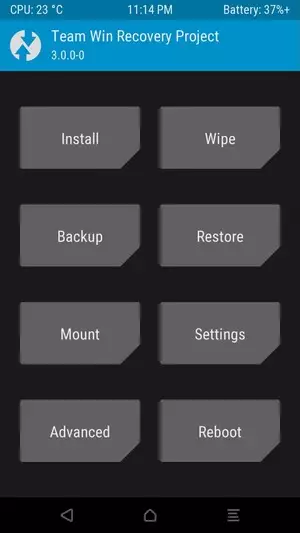
Before flashing, you need to delete all user data from the phone, this will avoid many problems. press 'WIPE' on the home screen.
Now you can start flashing. Click the 'Install' button.
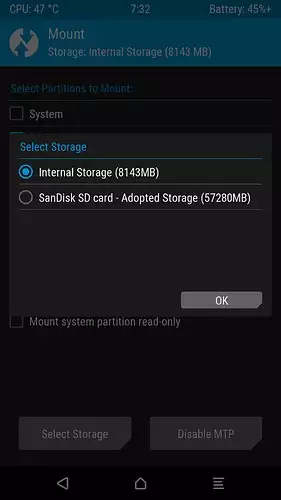
The file selection screen is displayed. At the very top is the 'Storage' button, which allows you to switch between types of memory.
Select the location where the files were copied. Press the OK button.
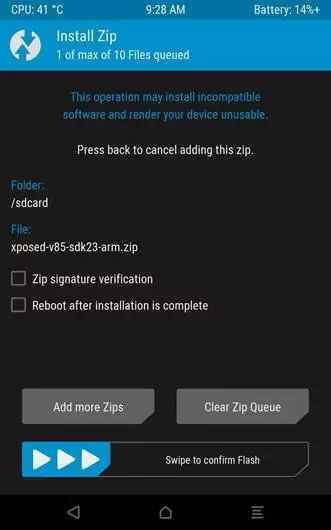
Find the file we need and click on it. A screen opens with a warning about possible negative consequences, you need to check the item 'Zip signature verification', which will avoid using corrupted files when writing to the phone's memory sections.
The procedure for flashing the phone will begin, accompanied by the appearance of inscriptions in the log field and the movement of the progress bar.
The completion of the firmware installation procedure is indicated by the inscription 'Successful'.
Summary: Type: Mobile; Battery: Li-Ion; CPU: MediaTek MT6580, Quad Core 1.3GHz, ARM Cortex A7, ARM Mali-400; Smart Phone OS: Android 5.1; Dimensions: 136 x 66 x 9.0 mm; Formfactor: Bar; Keyboard: Screen; Sidekeys: Volume, Power; Softkeys: 3; Weight: 140 g; Color: Yes; Colors: 16M; Other: Capacitive Touchscreen, Multitouch; Pixel aspect ratio: 1.50; Resolution: 570x320; Display PPI: 196; Screen Size: 5; Type: IPS; Audio: AAC, AAC+, AMR, AWB, MP3, Vorbis, FLAC, APE, MIDI, WAV; Camera: 5MP, 2592x1944; Other: LED Flash, Autofocus, Continuous Shooting, Digital Zoom, Digital Image Stabilization, Geo-Tagging, Panorama, High Dynamic Range (HDR), Touch Focus, Face Detection, White Bala ...
Comments, questions and answers on the flash firmware Xgody G400
Ask a question about Xgody G400

